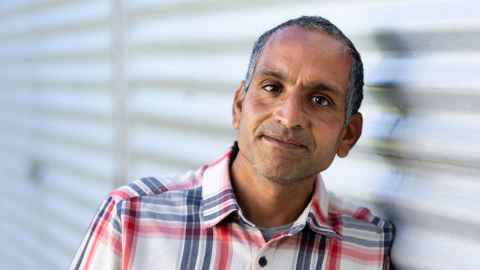University joins global refugee initiative
6 August 2025
An international project taking on one of the biggest challenges facing the world, forced migration, will now include input from the University of Auckland.

A global project tackling forced migration, a crisis which affects about one in every 67 people on Earth, according to the UN Refugee Agency, will now include input from a research centre devoted to refugee issues at the University of Auckland.
The Centre for Asia Pacific Refugee Studies (CAPRS), hosted by the University’s Faculty of Arts and Education, has been named the sole New Zealand organisation to join the seven-year initiative, Reimagining Responses to Forced Migration.
Focused on giving displaced people more power over their lives and the policies that affect them, the project is based in Canada and involves around 40 top universities and organisations worldwide.
Dr Ritesh Shah, the centre’s co-director, says the project recognises not just the urgency of the forced migration issue, which is leaving millions of people desperate and stranded for years at a time, but the critical need to rethink who produces knowledge and how that knowledge shapes policy and action.
“This project is built on the belief that we need to completely rethink how we study forced migration,” he says. “That means listening more closely to the people directly affected, involving them in the research process, and working together across different fields, cultures, and local communities to create knowledge and positive change.”

Shah says the initiative's shared commitment is to make sure the experiences and insights of displaced people shape how global refugee systems are designed and run, so the outcomes are fairer, more effective, and truly reflect their needs.
He says past research – and resulting policies – has tended to involve the Global North (higher income, more industrialised countries) telling the Global South, where the majority of displaced people are from, what they need.
“Being part of this initiative is a tremendous opportunity for CAPRS to ‘walk the talk’ so to speak, given our mission is to ensure forcibly displaced people are meaningfully engaged in research, policy and programmes that impacts their lives.”
The centre will play a key role across four working groups, under the broad headings of who gets to produce knowledge; different experiences of displacement beyond categories like ‘refugee’ and ‘asylum seeker’; turning academic knowledge into actions for policy makers; and building support for scholars who have experienced displacement, including mentorship, inclusion and leadership opportunities within academia.
Shah says in practice, that will involve centre researchers attending international discussions in person and online, as well as engaging in public debates with organisations like the Office of the United Nations High Commissioner for Refugees (UNHCR) and other global bodies.
Focused on giving displaced people more power over their lives and the policies that affect them, the project is based in Canada and involves around 40 top universities and organisations worldwide.
Associate Dean (Research) of the Faculty of Arts and Education Professor Nancy November is delighted CAPRS will be at the heart of this international collaboration.
“By bringing together our expertise in arts and education with the lived experience of displaced communities, we can ensure that scholarship leads to real policy change and tangible support for people rebuilding their lives," she says.
Co-led by Carleton University in Canada and the refugee-led organisation Refugees Seeking Access at the Table (R-SEAT), the initiative is funded in part by a CAD$2.5 million Partnership Grant from the Social Sciences and Humanities Research Council of Canada (SSHRC), and an estimated extra CAD $2.5 million in partner support.
Other universities involved include McGill and Ottawa in Canada, and the Universities of Oxford, Twente, Munster, York and Wollongong.
Organisations include the Global Migration Centre at Geneva Graduate Institute; International Institute of Humanitarian Law (Italy); South Africa Refugee Led Network and Coalicion por Venezuela.
Media contact
Julianne Evans | Media adviser
M: 027 562 5868
E: julianne.evans@auckland.ac.nz